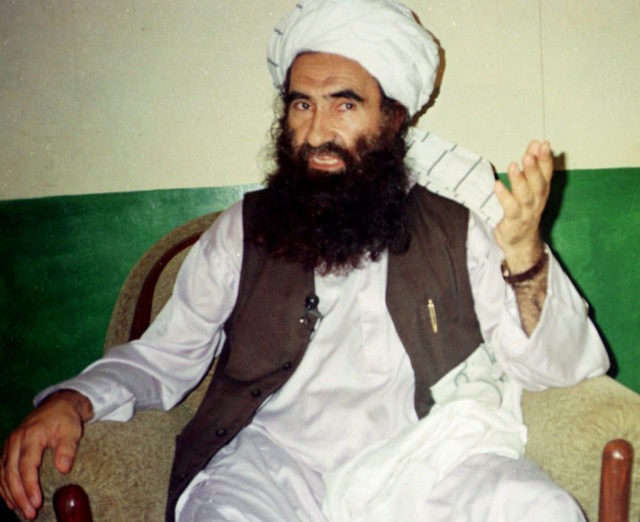The Taliban released a statement on Tuesday confirming the death of Mawlavi Jalaluddin Haqqani, founder of the notorious Haqqani Network (HN), a terrorist organization allied with the Taliban and al-Qaeda.
The Haqqani Network quickly made it known that new leaders are prepared to take over and Haqqani’s death will not hinder its operations.
The Taliban statement hailed Haqqani as a “prominent jihadi figure, religious scholar, exemplary warrior and pioneer of celebrated jihads” and said he died after being “ill and bedridden for the past several years.” Rumors of his infirmity or death have been circulating for several years.
“Just as he endured great hardships for the religion of Allah during his youth and health, he also endured long illness during his later years,” the Taliban statement said.
CNN quoted an Afghan official who said his government has information suggesting Haqqani actually died over ten years ago, but his death was concealed by his operatives and the Taliban until now. The official said Tuesday’s announcement is “obviously a part of their psychological warfare tactics” and advised carefully considering “the agenda of the Taliban behind this announcement.”
Some observers suggested the announcement of Haqqani’s death was timed to coincide with U.S. Secretary of State Mike Pompeo’s visit to Pakistan, which began with the announcement that America is suspending $300 million in military aid because Pakistan is not doing enough to fight militant groups like HN.
Another theory is that HN and the Taliban did not want to acknowledge Haqqani’s death until they felt secure enough to hold appropriate funeral ceremonies for him, softening the emotional blow of his demise to his ardent supporters.
The Haqqani Network became well-known to many Americans for its role in the capture and ransom of Bowe Bergdahl, but it was a major force in terrorism and Afghanistan politics long before that. Jalaluddin Haqqani formed the group in the late 1970s and developed it into one of the deadliest insurgent forces in Afghanistan. Analysts have variously described it over the years as an offshoot of the Taliban, their ally, a special operations unit of the Taliban war machine, or a mercenary force specializing in hostage acquisition and sales.
The Haqqani Network is based in the tribal region of Pakistan, sustained in part by the Haqqani family’s extensive legal and illegal business holdings. The family’s extensive tribal connections in Afghanistan and the military skills it developed while fighting the Soviet invasion have also been valuable resources.
A Stanford University report on the Haqqani operation explains how it uses its safe haven in Pakistan to launch terrorist attacks and give the Taliban an opening to reassert control over much of Afghanistan:
Over the last decade, rather than launching Al Qaeda style global jihad against the West, HN’s post-9/11 leadership employs political acts in pursuit of power, co-opting, infiltrating, and in some cases overtaking Western-backed Afghan institutions of governance across the war zone in a quest to consolidate power over the sovereign state and population.
In 2008, for example, Sirajuddin Haqqani engaged in a tactical alliance with a key commander in northern Afghanistan, Abdul Rauf Zakir, who requested financial assistance from HN in exchange for expanding HN’s influence and operations in Kabul and in select northern provinces of Afghanistan, namely, Takhar, Kunduz, and Baghlan. [23] Over time, Zakir has become a close confidante of Sirajuddin Haqqni, serving as the chief of suicide operations for HN, and facilitating HN’s military training program and high-profile suicide attacks.
HN’s most notable alleged attacks include a suicide bombing of a U.S. base in Khost province in 2009, a 19-hour siege on the U.S. Embassy and NATO headquarters in 2011, and an assault on a U.S. Consulate near the Iran border in 2013. Since the 2013 death of Taliban leader Mullah Omar, HN has become the only group with the cohesion, influence, and geographic reach to provide Pakistan with “strategic depth”—a territorial buffer on its western border. Its efforts have helped the Afghan Taliban credibly control or contest territory accounting for about one-third of the Afghan population.
For its part, Pakistan denies sponsoring Islamist militant proxies, but Western and Afghan officials say Islamabad also sponsors terrorism, in order to undermine Afghanistan and India. In 2011, Adm. Mike Mullen, then chairman of the Joint Chiefs of Staff, called HN a “veritable arm” of Pakistan’s premier intelligence agency, the Inter-Services Intelligence (ISI).
Sirajuddin Haqqani is Jalaluddin’s son and effectively the military commander of the organization since 2015, as well as a top leader in the Taliban hierarchy.
Both Jalaluddin Haqqani and his son are seen as a proxy for Pakistani influence within the organization, having developed ties with the infamous Pakistani intelligence service ISI during the uprising against the Soviets in the 1980s. The elder Haqqani was also considered a “prized asset” of the American Central Intelligence Agency (CIA) during that period, as the BBC put it.
The Haqqani Network gave assurances it has several well-trained leaders and its operations will not be compromised by the death of its founder. The Afghan government blames HN for carrying out several recent high-profile terrorist attacks with the indulgence or active assistance of the Pakistani ISI. Pakistani officials say the Haqqani organization is formally banned in their country and they are fully committed to working against it.

COMMENTS
Please let us know if you're having issues with commenting.